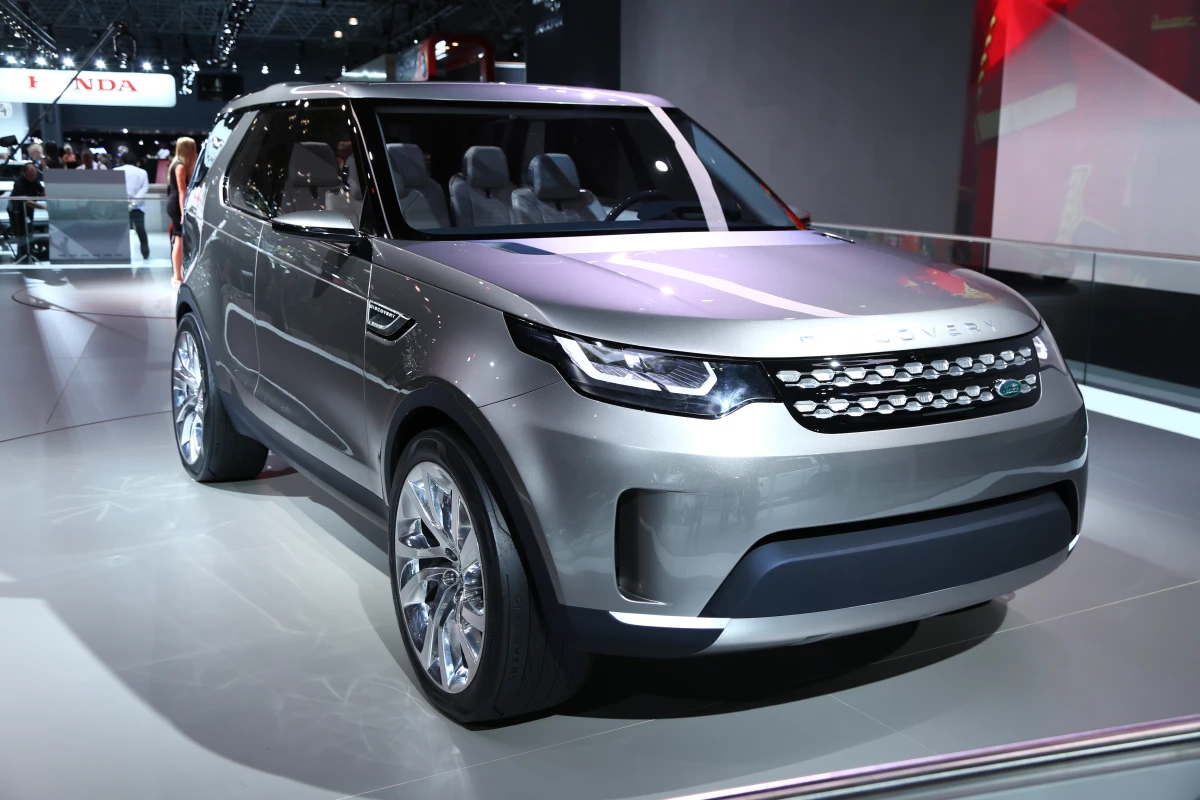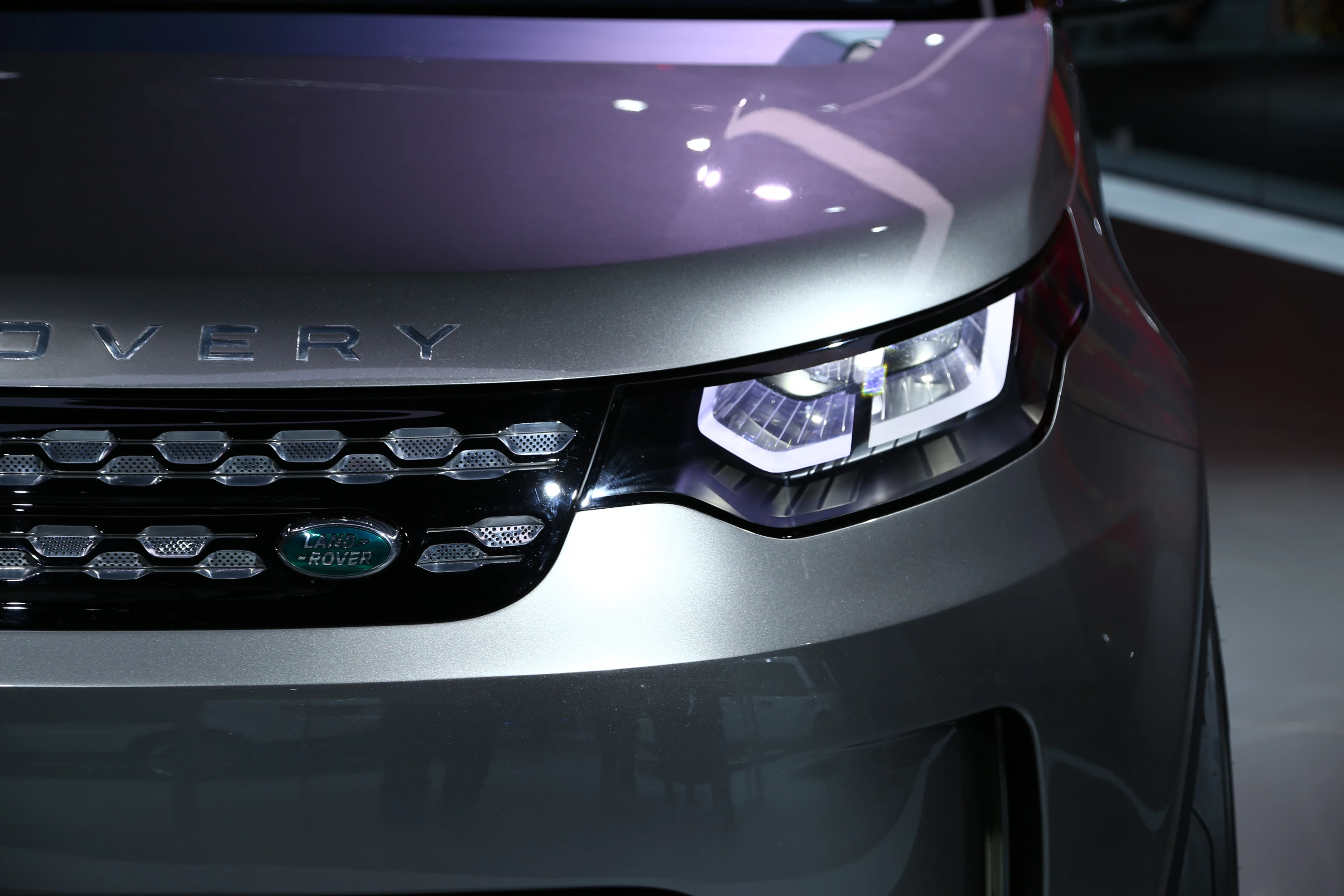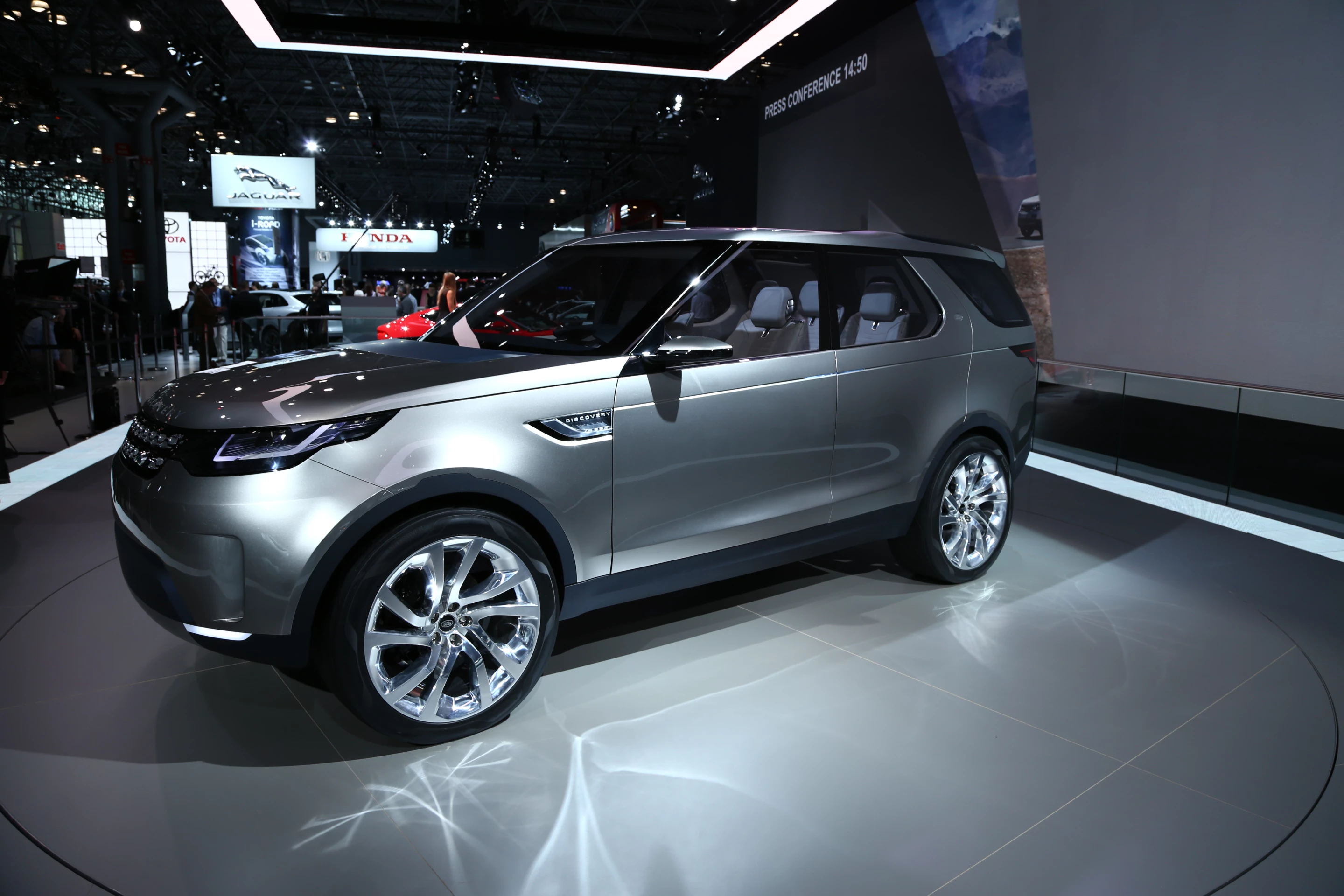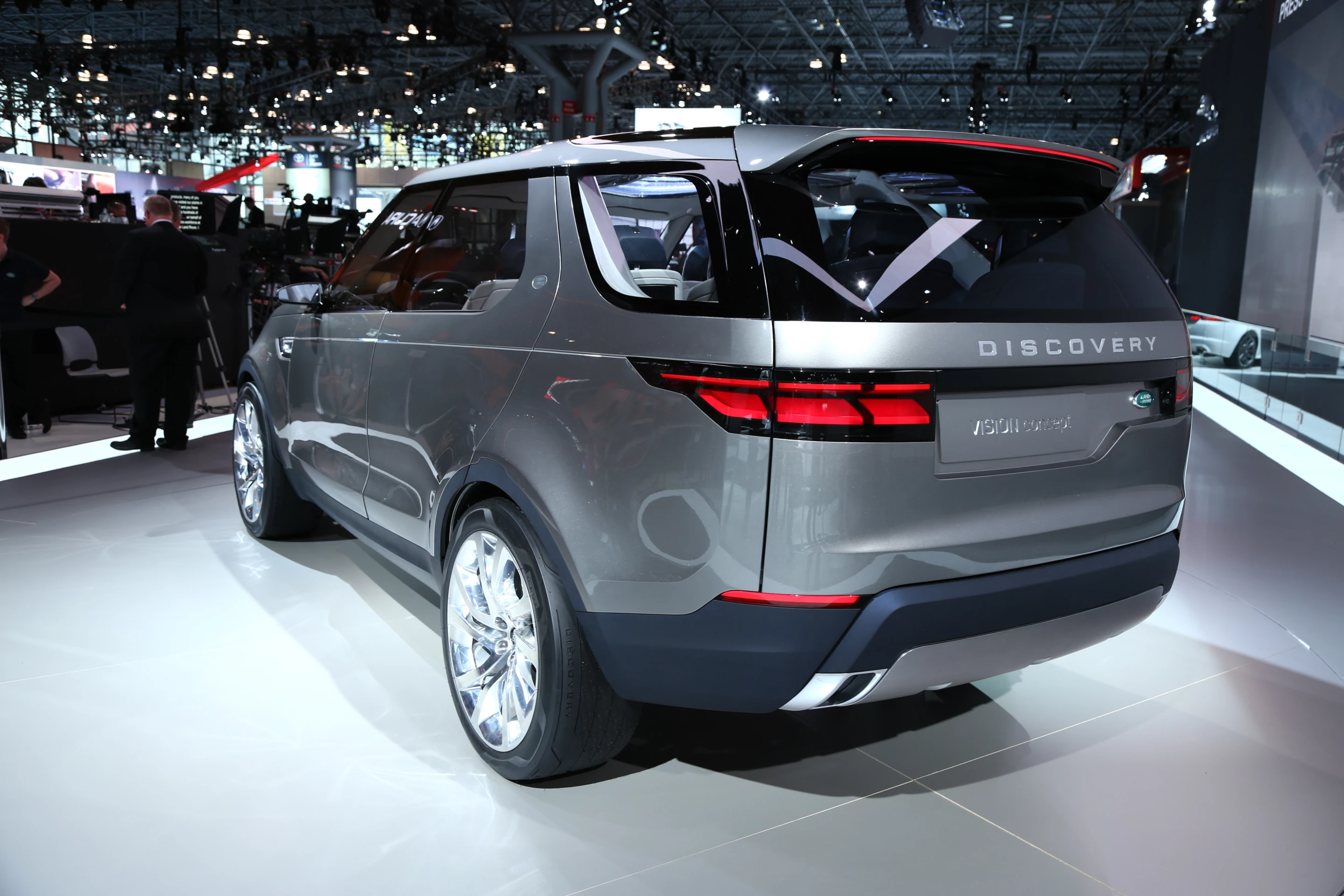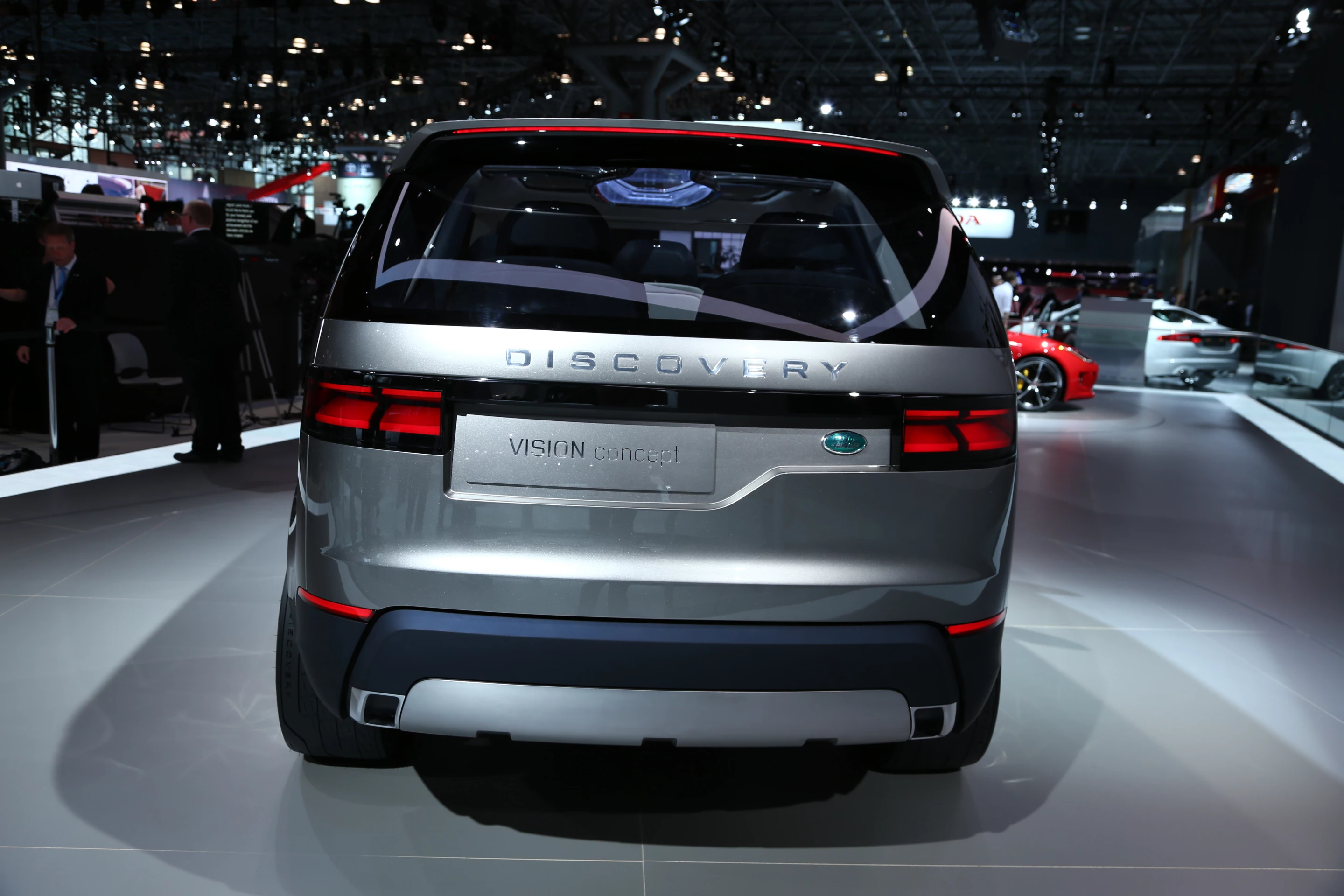Land Rover’s been dropping hints about its new Discovery Vision concept in the run up to the 2014 New York International Auto Show. Now before 200 VIP guests, the company has taken the lid off what turns out to be a design template for the new Discovery line as well as a showcase for the technologies that may end up in Land Rovers of the future. The debut aboard the USS Intrepid Air and Space Museum in New York City included a scale model of the Virgin Galactic spacecraft SpaceShipTwo as part of Land Rover’s new partnership with the space tourism company.
At this stage there isn’t anything for Land Rover to say about power, speed or handling in regards to the Vision. This is more of a demonstrator of new and projected technologies as well as introducing the style vocabulary of the new Discovery line. Like most Discovery models of late, it’s moved away from acting as a bridge between the practical Defender and the Chelsea tractors of the Range Rover line. It definitely seems aimed at the luxury market where watching polo matches is more likely than an afternoon seeing how much mud you can churn up. However, that doesn’t keep it from being a showcase for technologies that may one day make driving across the Andes a bit easier.
In terms of coachwork, the Vision is a bit underwhelming with much of the distinct Disco styling abandoned in favor of a cross between a generic 4X4 and a Range Rover. With a Tribeca Grey finish, stepped roof, alpine lights, high beltline, and short front and rear overhangs, it’s more sedate than previous Discovery models, but beneath the conservative exterior are a number of surprises including doors that are operated by gesture control, which removes the need for handles. The front and rear doors open in opposite directions to reveal the absence of a B pillar and a single large space for easy entrance and exit. Below the doors are sill steps that automatically deploy while LED lamps light up the ground below.
The electrically-powered split tailgate is also gesture-controlled and includes a “social seat,” which is basically a flip-up seat and an event platform that slides out from under the boot floor that provides a place to stand for watching sporting events.

Laser headlamps
The Vision’s LED daytime running lights are conventional enough, but the high-tech tone of the concept is set by the very bright, pure white light created of the laser-activated phosphor projection headlamps. These extremely compact lights put out light for a distance of over 984 ft (300 m) and include a high-definition camera that detects oncoming traffic and automatically dip the parts of the lights that might might dazzle the other driver, while maintaining visibility on other parts of the road.
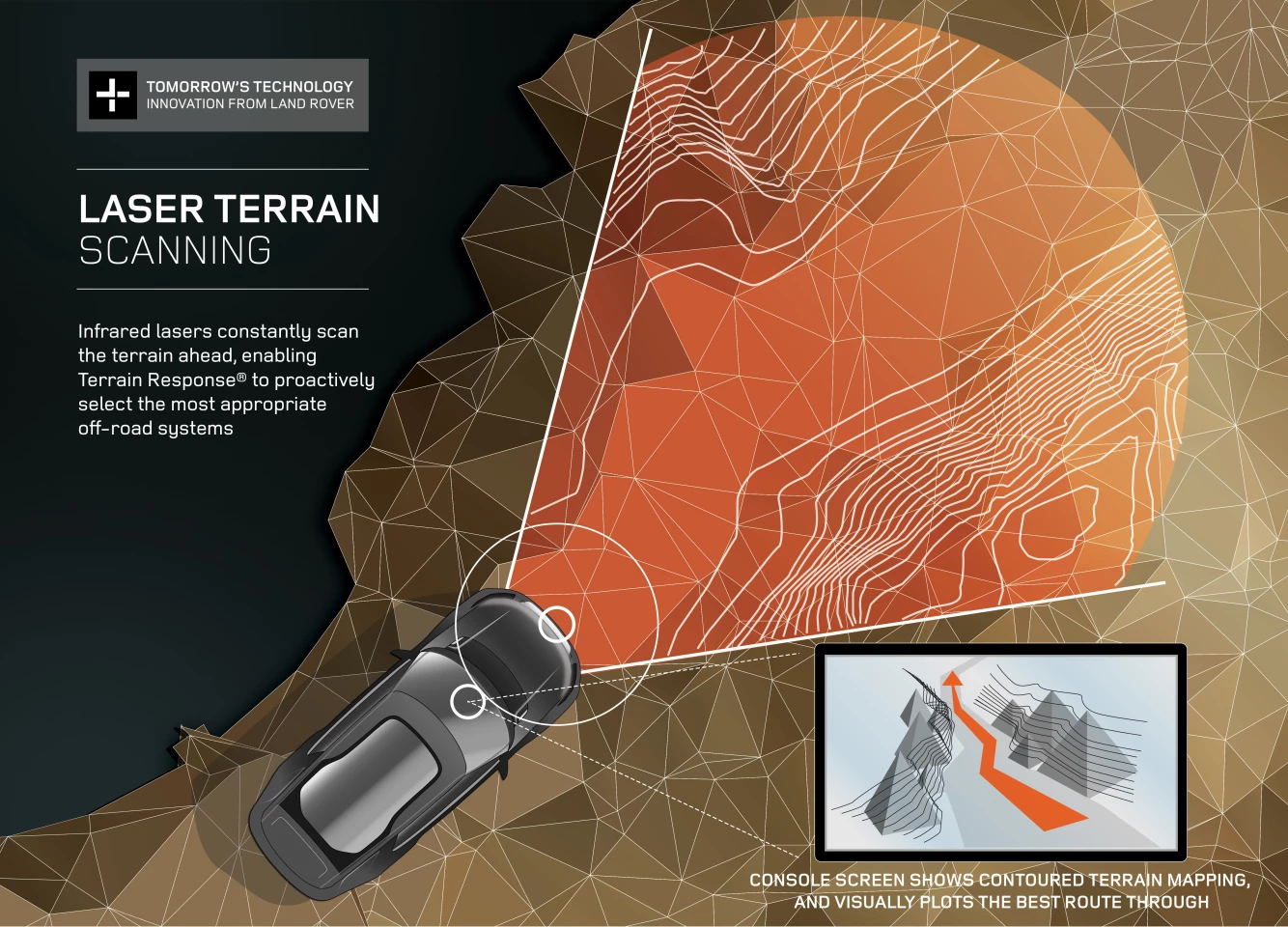
Laser Terrain Scanning
The Vision's lasers go far beyond high-tech headlamps. The foglamps on either side of the undershield contain infrared and colored lasers that scan the ground ahead and use the data to form a map of the terrain. This is shown on the driver’s display and plots the best route through as a way of taking the guesswork out of operating in rough country.

Laser Referencing
Another use of lasers in the Vision is Laser Referencing, where visible lasers project symbols on the road or ground ahead. These can be warning triangles to alert other drivers of a stalled vehicle, or reference marks to help the driver judge whether it’s possible to parking in that tiny spot or get through that tight squeeze without an expensive paint scraping.
Terrain Response
The Discovery line has made a name for itself with its systems to assist the off-roader. The Vision’s Terrain Response system takes this to the next level. Unlike current systems that adapt torque and traction to the conditions under the wheels, Terrain Response scans the ground ahead using infrared lasers and anticipates the incline, terrain type, and other factors as it decides which of the car’s terrain-tackling systems to engage next.Lasers are also key to the Wade Aid system which is a forward-pointing depth sounder for fording streams without learning that it’s too deep by the horrid sound of the engine sucking in water.
To take advantage of this new laser-derived data, the Discovery Vision Concept's all-terrain capability has three different levels. There’s All Terrain Progress Control, which controls the vectors torque for semi-autonomous off-road driving at a steady speed, All Terrain Coach, which is basically switching to manual while providing the driver with recommendations as to which system to use next, and Enhanced All Terrain Coach, which maps the terrain ahead, marks out a route, and suggests appropriate systems along with step-by-step navigation.

“We see the autonomous car taking away the boring, the tedious, the routine part of the journey while allowing the driver to actively stay in contact, do some work, or relax with the vehicle’s infotainment system,” says Dr Wolfgang Epple, Director of Research and Technology at Jaguar Land Rover. “But when the driver wants to enjoy the driving experience, our new driver assistance systems will give them more because customers will still want to be engaged with their vehicle. A smarter car should not take away driving pleasure – it should enhance the driver’s experience on- and off-road.”

Remote Control
One rather neat little innovation for the Vision is that you don’t even need to be inside it to drive thanks to the Remote Control Drive system. The Vision comes with a removable secondary rotary on the center console that allows the car to be controlled at very low speeds without anyone at the wheel. This can also be done using a smartphone or tablet app. Naturally, Land Rover is keen to emphasize that this works only at very short range and is heavily encrypted.The idea behind the remote control is that it can not only be used in extreme off-roading when it might be safer to be out of the car while trying to negotiate a bend in a Grand Canyon goat trail, but can also make hitching trailers or getting through a string of gates a bit less tedious.
Interior
In designing the interior of the Vision, Land Rover aimed at a spaciousness and an airy feel with plenty of headroom. Decked out in Nimbus and Navy premium leather with Sky Blue contrast stitching and open-pore grey wood veneer, the interior is highlighted by polished and brushed aluminum finishes, plus a large panoramic roof. Running the length of the interior is the SkyLight cabin light. Like the doors, this too is gesture controlled, allowing the passengers to activate it and set the light level with a literal wave of a hand.The luxury interior also incorporates include pop-out coat hangers, fold-out tray tables and tablet docking ports. Taking inspiration from the original Discovery’s center-console handbag, there's also detachable hard-case luggage in the doors that convert into stroller bags with wheels and extendable handles.
The Vision seats seven in a 2+3+2 layout in sculpted, wrap-around seats. The rear two rows of seats can slide forward and back individually or in rows, and can fold down to form tables or increase storage space. The back of each seat contains a gesture-controlled 10-inch high-res infotainment screen which controls windows and the infotainment systems. This allows passengers to see and talk to one another without all that tedious head turning or person-to-person contact.

The Vision’s dash looks a bit bare, consisting largely of a leather-wrapped aerofoil-shaped structure and two high-resolution touchscreens without the usual array of controls. The lower screen conceals a binnacle with an induction pad to wirelessly charge smartphones and other devices. In front of the driver is an instrument cluster, which features a high-definition screen with a 3 megapixel resolution.
The steering wheel shows how pervasive gesture control is in the Vision concept. Billed by Land Rover as next-generation Human-Machine Interface technology, the system not only opens the doors, the hatchback, the lights and the infotainment system, but even operates the turn signals, the headlamps, and just about every other function that doesn’t involve actually turning the wheel or pressing a pedal.
To achieve this, the steering wheel incorporates two small OLED touchscreens that take the place of almost everything that used to be done by buttons or stalks. Meanwhile, there’s a rotary gearshift control, which deploys and rises into the driver's hand as it approaches, and a secondary rotary which controls functions such as Terrain Response and Tow Assist. This secondary rotary can detached and taken out of the vehicle to operate Remote Control drive.

The entire system is controlled by intuitive gestures with calibrated motion sensors that recognize designated hand or finger movements and prevent the system from responding to gestures made in animated conversation ... or directed at drivers who run red lights.
“Gesture control is only one of many interesting possibilities,” says Dr Epple. “In the next 25 years we will use gaze and biometrics to interact with the vehicle. Speech control will also play a more important role. The almost unlimited processing power of The Cloud will enable more sophisticated algorithms for speech recognition and interaction than could ever exist on board the car. The Cloud offers the solution to next-generation voice recognition systems.”
A rolling panopticon
One bit of technology featured in Land Rover’s hints of the Vision is the Transparent Bonnet, which uses cameras in the grille and a heads up display in the windscreen to produce the illusion that the front of the car is transparent for easier off-roading and maneuvering in tight quarters. That, however is only the tip of the virtual iceberg.Cameras are embedded in the aerodynamic wing mirrors to provide the driver with extended field of vision while parking and reversing. Going beyond this, the entire glass house of the Vision is one giant computer touch screen thanks to smart glass technology.
When a finger approaches any of the windows they can display real-time information on landmarks or amenities. This system incorporates eye tracking sensors that judge what passengers are looking at and displays information accordingly. The displayed information can also be swiped to a seatback touchcreen, a tablet, or smartphone.
“If you are driving past a landmark like the Empire State Building, you could imagine a Wikipedia page appearing on the smart glass, and a rear seat passenger swiping that information from the window to their infotainment screen or tablet,” says Dr Epple.

The windows can also be turned into mood screens and the skyroof can even make a cloudy day into a sunny one, or a bright day into a starry night.
“Look around and it’s obvious most people know how to use a smartphone or tablet,” says Dr Epple. “Tablet computers and smart phones will merge with the car to provide both the functionality of the device plus the functionality of the car’s control systems. This will have the happy effect of greatly simplifying car interiors. With the recent Range Rover and Range Rover Sport, our designers pushed extremely hard to reduce the number of buttons and switches by more than 50 per cent. This trend will continue.”

Virgin Galactic partnership
As part of the unveiling, Land Rover announced that it has entered into partnership with Sir Richard Branson’s Virgin Galactic. The space tourism company will work with Land Rover to encourage young people to pursue careers in science and engineering, and Virgin Galactic.Land Rover will provide a fleet of cars to transport staff and passengers both at Virgin Galactics test center in the Mojave desert in California and its New Mexico spaceport. In addition, Land Rover has brought a full-scale mock up of SpaceShipTwo VSS Enterprise to the USS Intrepid, where it will be exhibited.
“The car of the future will become more capable, cleaner, more connected, more desirable and more intelligent,” says Dr Epple. “We are showcasing some very exciting new technologies on the Discovery Vision Concept car. While some have real potential and others are just concepts, both Jaguar and Land Rover will continue to set new standards and continue to grow by bringing these new technologies and innovations to our customers.”
Land Rover says that the first of the new Discovery line will go on sale in 2015.
The video below introduces the Land Rover Discovery Vision concept.
Source: Land Rover
